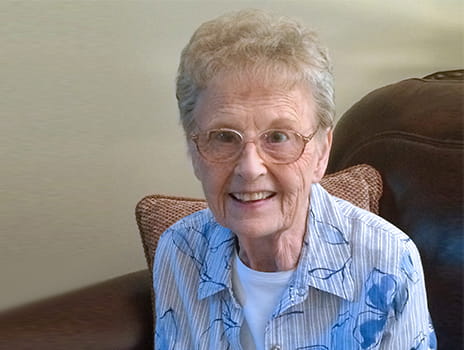Esophageal Reconstruction Provides a Return to Normalcy


Clara "Fern" Shaw thought she was having routine surgery to repair a hiatal hernia when she was admitted to the hospital in 2009. However, what should have been a standard procedure turned into a life-altering event for Shaw, 82, of Topeka.
During the laparoscopic procedure to repair her hernia, the surgeon accidentally cut her esophagus. The first attempt to repair the tear was not successful so an emergency surgery to mend the re-torn esophagus was performed three days later. Unfortunately, this procedure resulted in the complete severing of her esophagus. As a result, Shaw required a feeding tube, suffered a collapsed lung and developed blood clots in her lungs as well as a critical case of mediastinitis, inflammation of the area between the lungs.
Shaw spent 18 days in intensive care and several months at a rehabilitation facility. When she returned home, she still could not swallow.
Her medications caused internal bleeding, her feeding tube frequently dislodged and she had recurrent infections. The situation seemed hopeless, she says.
I'm so grateful. They performed a miracle. I don't know what I would've done without them. They gave me my life back. – Clara Shaw
Shaw's grandson, Dustin Griffith, who works in the medical field, recommended she contact specialists at The University of Kansas Health System. After a comprehensive and multidisciplinary evaluation, Shaw had a 9-hour surgery to reconstruct her esophagus.
The procedure, performed in 2012, involved an arm flap to recreate her upper esophagus. "My surgeons had to reroute everything around my voice box so I would still be able to speak," she says. "They took a skin flap from my forearm to reconstruct my esophagus."
Shaw's multidisciplinary team included otolarynologists, internists, surgeons, cardiothoracic surgeons and pulmonary and critical care specialists.
"I'm so lucky they were all willing to work together to help me," Shaw says.
After several months of healing, Shaw passed her swallow test and began to eat pureed foods and drink liquids. She was able to rid herself of the feeding tube in 2013.
"I'm so grateful. They performed a miracle," Shaw says. "I don't know what I would've done without them. They gave me my life back. I thought I'd never be able to eat real food again. And, oh, that morning cup of coffee is even more special now."
Shaw's diet consists of softer versions of food that many take for granted. She still marvels at the fact she can eat and drink on her own. "Before, I couldn't even swallow my own saliva. I would go through 30 washcloths daily as the saliva leaked from the hole (fistula) in my neck. It was impossible to go out of the house for anything," she says.
Shaw says the care she received at The University of Kansas Health System was perfect. "You can't imagine how happy I am that I was referred there. At all times, the nurses and physicians were attentive, kind and helpful. I know I wouldn't have received better care anywhere else. Without the amazing care from my surgeons, doctors, nurses and caregivers, I know I wouldn't be here today. Prayers have been answered and I'll never be able to thank everyone enough," she says.
We offer a variety of appointment types. Learn more or call 913-588-1227 to schedule now.